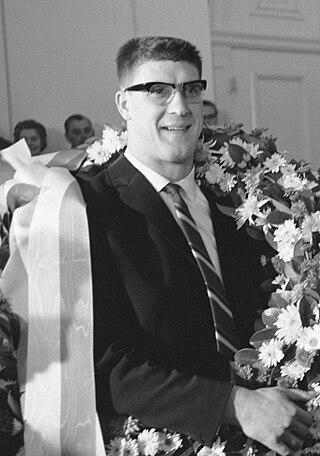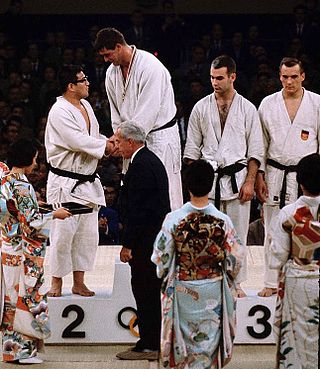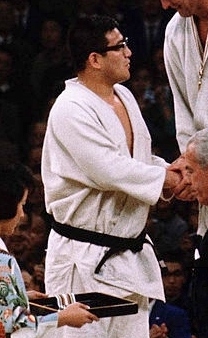
Antonius Johannes Geesink was a Dutch 10th dan judoka. He was the first non-Japanese judoka to win gold at the World Judo Championships, a feat he accomplished in 1961 and 1965. He was also an Olympic Champion, having won gold at the 1964 Summer Olympics in Japan, and won a record 21 European Judo Championships during his career.

Judo was first included in the Summer Olympic Games at the 1964 Games in Tokyo, Japan. After not being included in 1968, judo has been an Olympic sport in each Olympiad since then. Only male judoka participated until the 1988 Summer Olympics, when women participated as a demonstration sport. Women judoka were first awarded medals at the 1992 Summer Olympics.

Amateur boxing is a variant of boxing practiced at the collegiate level, at the Olympic Games, Pan American Games and Commonwealth Games, as well as many associations.

David Donald Hubert Roger Douillet is a French politician and retired judoka.
The UCI Road World Championships are the annual world championships for bicycle road racing organized by the Union Cycliste Internationale (UCI). The UCI Road World Championships consist of events for road race and individual time trial, and as of 2019 a mixed team relay.

The World Judo Championships are the highest level of international judo competition, along with the Olympic judo competition. The championships are held once every year by the International Judo Federation, and qualified judoka compete in their respective categories as representatives of their home countries. Team competitions have also been held since 1994. The men's championships began in 1956, though the format and periodicity of the championships have changed over time. The last edition of the championships took place in Doha, Qatar in 2023.

The open category was a judo event held as part of the Judo at the 1964 Summer Olympics programme. The weight class allowed judokas of any weight. The competition was held on Friday, October 23, 1964.

Jan Snijders is a retired judoka from the Netherlands. Together with his twin brother Peter Snijders, Anton Geesink, Hein Essink, Tonni Wagenaar, Coos Bontje, Jan van Ierland, Martin Poglajen, Joop Gouweleeuw, Wim Ruska, Ernst Eugster, Henk Numan, Peter Adelaar, Willy Wilhelm, Anthony Wurth and Theo Meyer he belongs to the generation of Dutch top judoka which gained their successes in the 1960s and 1970s.

Isao Inokuma was a Japanese judoka. He won a gold medal in the heavyweight division at the 1964 Summer Olympics in Tokyo and a world title in 1965.

Akio Kaminaga was a Japanese judoka who won a silver medal in the open weight category at the 1964 Summer Olympics.
Koji Sone was a Japanese judoka and world champion.
Openweight, also known as Absolute, is an unofficial weight class in combat sports and professional wrestling. It refers to bouts where there is no weight limit and fighters with a dramatic difference in size can compete against each other. It is different from catch weight, where competitors agree to weigh in at a certain amount without an official weight class. While weight classes are usually mandatory now, openweight competition was the norm for combat sports since antiquity and continues into the modern day.
The 1964 European Judo Championships were the 13th edition of the European Judo Championships, and were held in East Berlin, East Germany on 25 and 26 April 1964. The Championships were held in three separate categories: junior, amateur, and professional. The amateur contests were subdivided into four individual competitions, and a separate team competition, which was held in East Berlin on 18 May. The Soviet and other Socialist judokas were allowed to compete professionally but on a strictly non-profit basis. As before, more than one representative of a single national team were allowed to qualify for participation in each event. Soviet judokas won the judo crown, leading the overall medal table.
The 1965 European Judo Championships were the 14th edition of the European Judo Championships, and were held in Madrid, Spain, from 23 to 24 May 1965. The Championships were held in two separate categories: amateur and professional. The amateur contests were subdivided into six individual competitions, and a separate team competition. As the Soviet and other Socialist judokas were competing on a strictly non-profit basis, they were allowed to compete both professionally, and as amateurs. As before, more than one representative of a single national team were allowed to qualify for participation in each event.
The 1963 European Judo Championships were the 12th edition of the European Judo Championships, and were held in Geneva, Switzerland on 11 May 1963. The Championships were held in two separate categories: amateur and professional. The amateur contests were subdivided into four individual competitions, and a separate team competition. The Soviet and other Socialist judokas were allowed to compete professionally but on a strictly non-profit basis. As before, more than one representative of a single national team were allowed to qualify for participation in each event.
The 1966 European Judo Championships were the 15th edition of the European Judo Championships, and were held in Luxembourg City, Luxembourg from 6 to 7 May 1966. Championships were subdivided into six individual competitions, and a separate team competition. Individual events were not discriminated into amateur and professional as before.
The 1969 European Judo Championships were the 18th edition of the European Judo Championships, and were held in Ostend, Belgium from 15 to 18 May 1969. Championships were subdivided into six individual competitions, and a separate team competition.
The Mixed Team tournament in Judo at the 2014 Summer Youth Olympics was held on August 21 at the Longjiang Gymnasium.

Distria Krasniqi is a Kosovar judoka. She received a gold medal in the women's 48-kg judo competition at the 2020 Summer Olympics in Tokyo. In August 2021, she was awarded the Honor of the Nation Decoration of Albania by the President of Albania.

Judo competitions at the 2024 Summer Olympics in Paris are scheduled to run from 27 July to 3 August at Grand Palais Éphémère in Champ de Mars. The number of judokas competing across fourteen different weight categories at these Games has been gradually trimmed from 386 in Tokyo 2020 to 372, with an equal distribution between men and women. Despite the slight changes in athlete figures, the judo program for Paris 2024 remains constant from the previous editions, as the competition will feature an equal number of bodyweight classes for men and women, with seven each, and the return of the mixed team tournament for the second time, an event introduced three years earlier in Tokyo.











